Over the past decade, Yale University has asked the American public a wide range of climate-related questions. This includes if they believe in climate change. This week the Yale Program on Climate Change Communication released local “Climate Opinion Factsheets”. The factsheets include key measures of public climate change knowledge, attitudes, policy support, and behavior. They are broken down for each of the 50 states, 435 congressional districts, and 3,142 counties across the US. It turns out Michigan residents have a strong viewpoint on climate change. Michigan has even stronger expectations of what to do about it.
Michigan Residents Views and Beliefs on Climate Change
Overall, a majority of Michigan residents, (65%) consider global warming to be happening now. They feel its affecting the weather and its caused mostly by human activities. However residents are split in the thinking that most scientists think global warming is happening.
Michigan residents have a slightly passive view on the risks of global warming. A majority of Michigan respondents to the survey, (57%) are worried about global warming, its harm on future generations. They are also concerned for those in developing nations and others in the U.S. However a majority does not feel it will harm them personally. (39%)
Perhaps the most eye opening aspect of the survey involves Policy Support of what to do about it. An overwhelming majority of Michigan respondents approve funding research into renewable energy sources, (84%) and provide tax rebates for energy efficient vehicles or solar panels. (82%) Michigan respondents also think schools should teach about global warming, (77%) as well as regulating Co2 as a pollutant and set strict limits on CO2 on existing coal-fired power plants.
However only about a third of respondents indicated that they discuss global warming at least occasionally. Less than one-third recall hearing about it in the media at least once a week.
Lastly, the indicators on who should do more about global warming is the responsibility of corporations, (70%) and the citizens themselves. (63%)
Here are some of the key metrics and insight for Michigan’s view on Climate Change.
Michigan’s Survey Results on Climate Change


Survey Impact and Information
Public opinion about global warming is an important influence on decision making. American opinions vary widely depending on where people live. To see this Michigan factsheet go to the Michigan Public Opinion on Climate Change 2019. To see the response on the 10th Congressional district that covers all of the Michigan Thumb region go to Congressional District 10 (115th Congress) Michigan Public Opinion of Climate Change 2019.
For information on the survey methodology and questions used see Yale Climate Opinion Maps 2019.
Impact of Climate Change on Michigan
According to the EPA, Michigan’s climate is changing. Most of the state has warmed 2 to 3 degrees (F) over the last 100 years. Heavy rainstorms are becoming more frequent. Ice cover on the Great Lakes is not forming or freezing over late in the winter and melting sooner. Over the next several decades, its expected that Michigan will have more extremely hot days. This may harm public health in urban areas and impact agricultural areas areas.
Impact of Climate Change to the Great Lakes
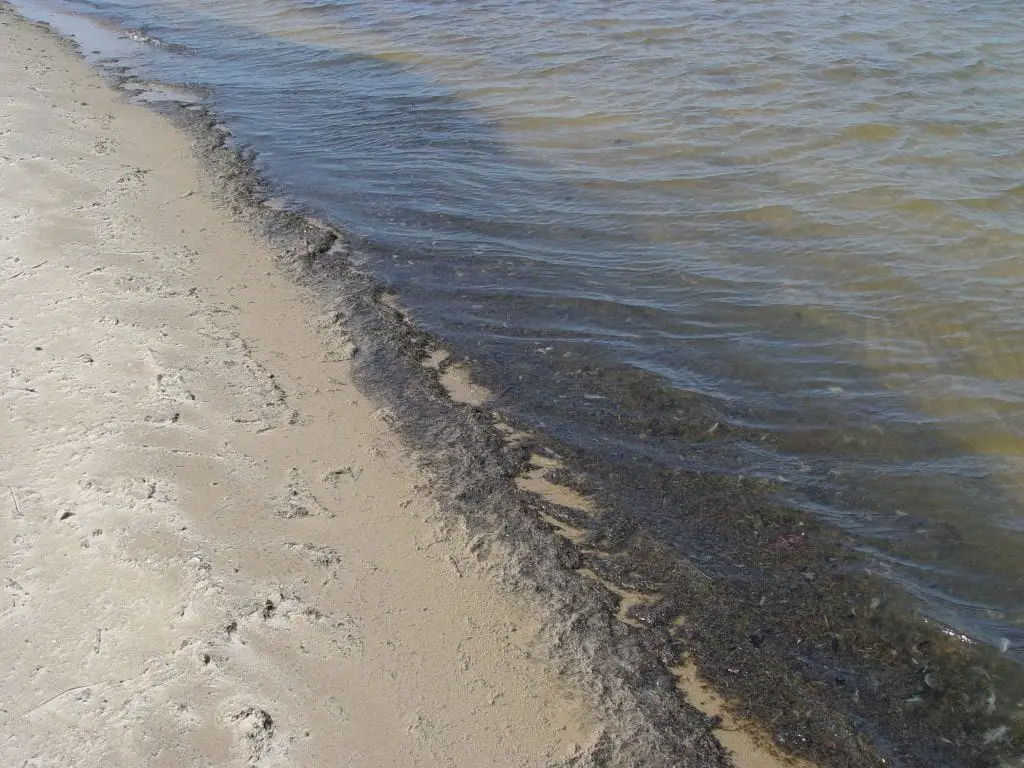
Changing the climate is likely to harm water quality in Lake Erie and Lake Michigan. Warmer water tends to cause more algal blooms, which can be unsightly, harm fish, and degrade water quality. During August 2014, an algal bloom in Lake Erie prompted the Monroe County Health Department to advise residents in four townships to avoid using tap water for cooking and drinking. Severe storms increase the amount of pollutants that run off from land to water. Thus the risk of algal blooms will be greater if storms become more severe. Severe rainstorms can also cause sewers to overflow into lakes and rivers, which can threaten beach safety and drinking water supplies. For example, heavy rains in August 2014 led to nearly 10 billion gallons of sewer overflows in southeastern Michigan, much of which ended up in Lake St. Clair and eventually Lake Erie
Flooding
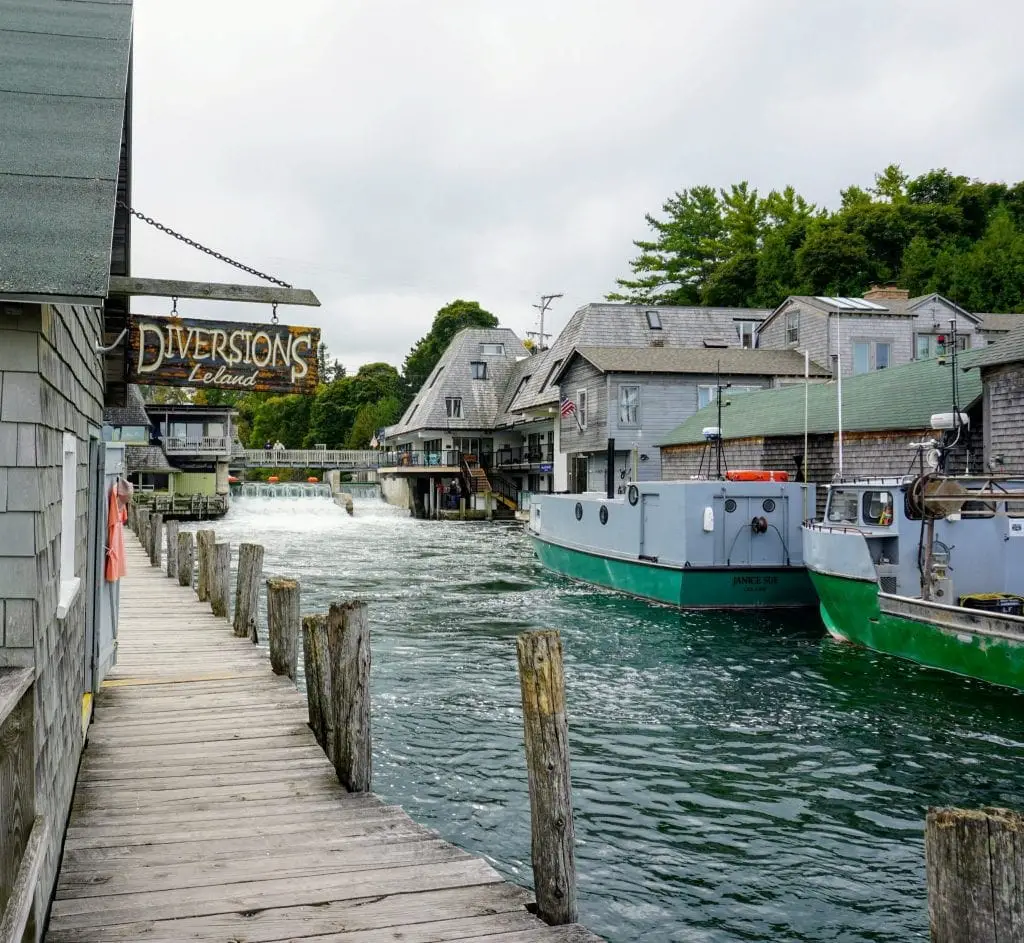
The changing the climate may increase the frequency of floods in Michigan. Over the past fifty years the annual precipitation average over most of the Midwest has increased by 5 to 10 percent. The most intense days of rain each year has increased by about 35 percent. The high water in Lake Michigan has forced the town of Leland to raise the iconic fishing sheds of Fishtown to accommodate rising water.
Shorter Wetter Winters for Michigan
Warmer temperatures will likely to shorten the typical winter we are used to in Michigan This will undobtably impact ice fishing, and recreational activities such as snowmobiling, snowboarding, and skiing. A short or stunted winter could harm the local economies, especially in the Upper Peninsula that depend on them.
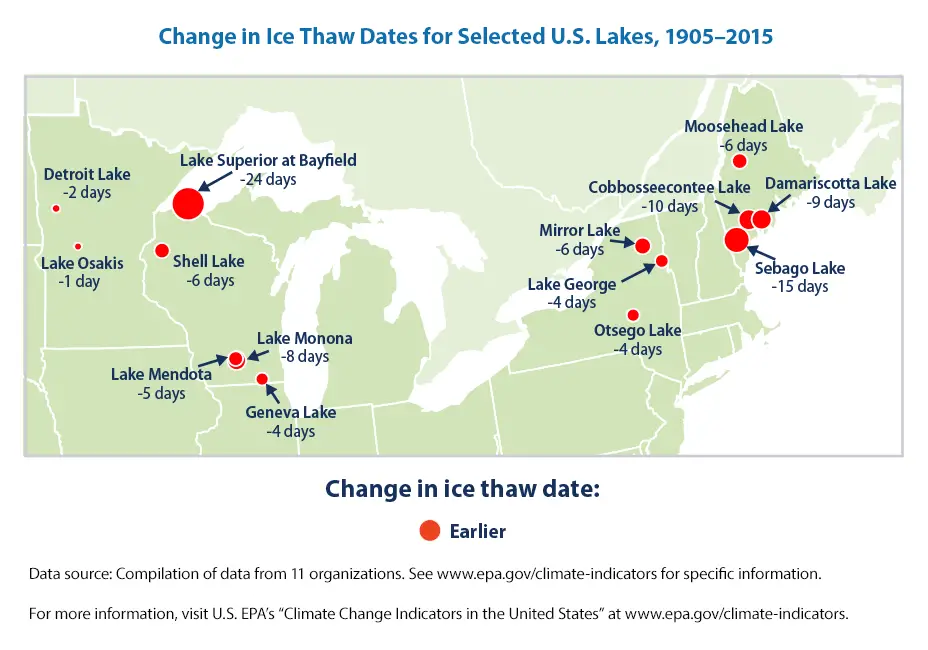
Since the early 1970s, ice coverage in the Great Lakes has decreased by 63 percent. However, due to the open water on the lakes, we may see greater lake effect snow in certain areas of the state. This is especially evident along the Lake Michigan shoreline and the Upper Thumb.
Climate Change Impact on Agriculture
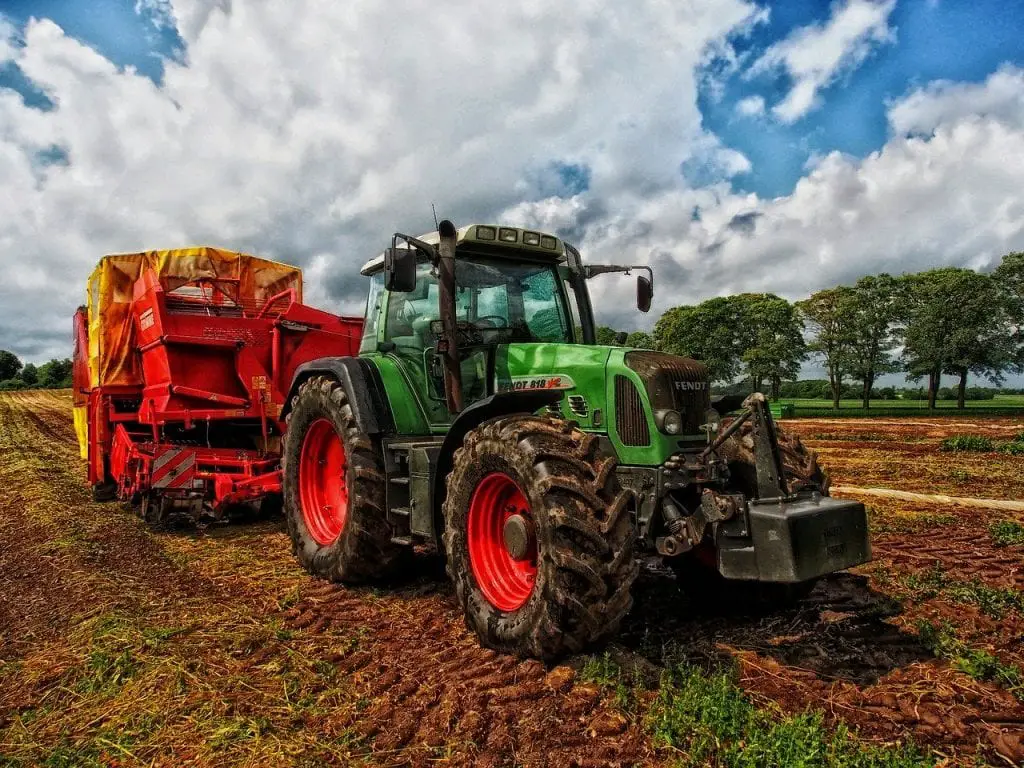
The impact of climate change on agriculture business is direct and major. The spring of 2019 was meet with high precipitation with caused delay in corn and soybean planting due to flooded fields. 2019 has been deemed the third-wettest season in recorded history. Late summer rains also impacted the corn harvest.
On the plus side, warmer temperatures and shorter winters mean a longer growing season. This could increase agricultural output in some crops. stresses associated with climate change are expected to decrease agricultural productivity overall.
Climate Change Impact on Michigan’s Upper Thumb
A groundbreaking analysis of National Oceanic and Atmospheric Administration temperature data by the Washington Post shows major areas of the United States near or has already crossed the 2-degree Celsius mark. Climate change effects in Michigan are also temperature. The two-degree Celsius measurement is thought to indicate a doubling of CO2 levels from pre-industrial levels and be a tipping point for catastrophic environmental change. Data was taken from more than a century across the Lower 48 states and 3,107 counties to create this hot spot map.
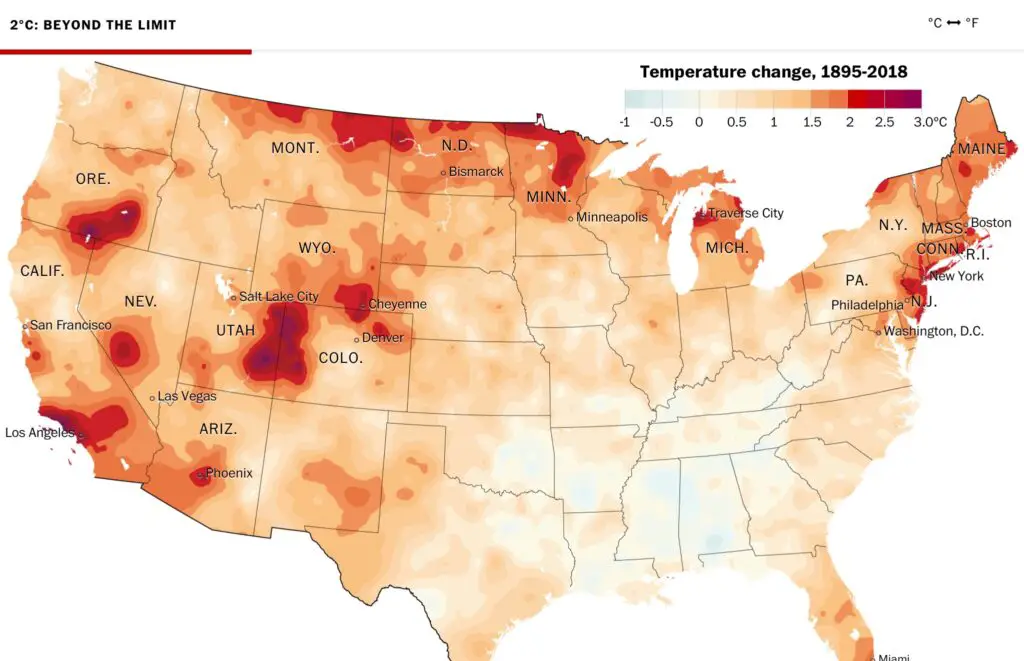
Michigan’s Climate Change is Measurable
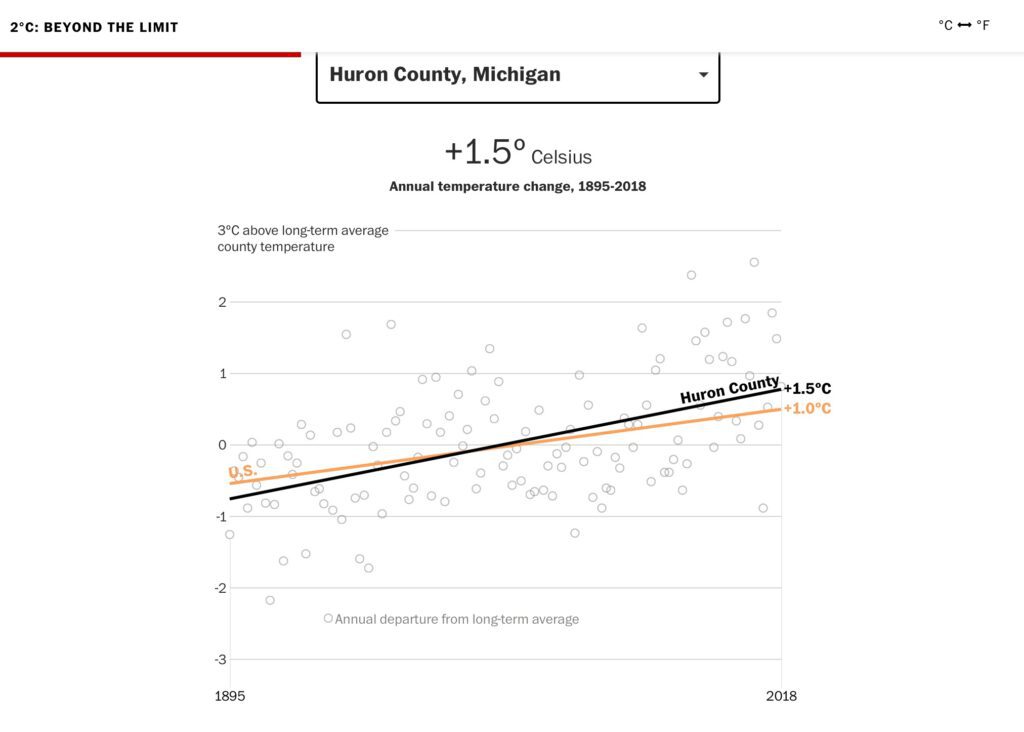
The Grand Traverse County area in northwest Michigan has exceeded 2.3C in measurements taken since 1885. Closer to home, Huron County’s average rise is 1.5C.
The impact of this slowing rising temperature affects our environment in different ways. Warmer winters mean less ice and snow coverage. When Lake Huron freezes over the ice and snow reflect solar radiation back into space, keeping the area relatively cool. But with less ice and snow, the lake and ground absorbs the solar radiation and warms into a self-feeding cycle.
Other Impacts of Climate Change in Michigan

The other climate change effects in Michigan is to agricultural growing seasons and lake water quality is a concern too. Pests, no longer controlled by cold winter weather, are affecting people and crops with increasing frequency. Toxic blue-green algae are a regular feature in Lake Erie and Saginaw Bay in late summer. It’s advisable to avoid swimming, wading, and watersport activities when the pea-soup like algae is seen on the beach.
Source
2°C: BEYOND THE LIMIT – Extreme climate change has arrived in America – Washington Post
Related Reading on Climate Change Effects in Michigan
Canadian government confirms potential site for Ontario Canada nuclear waste site less than 70 miles away from Michigan on Lake Huron. See Canada Confirms Potential Nuclear Waste Site Near Lake Huron And Michigan
After 45 Years of Dow Chemical Dioxin Clean Up Dow DuPont is preparing to clean up the last section of the Tittabawassee River in mid-Michigan that has been contaminated with dioxin from past operation of a Dow Chemical plant in Midland Michigan. See Dioxin Clean Up In Saginaw Bay Watershed
Huron County Michigan’s 2015 moratorium on new development of wind power in Michigan’s Thumb gave rise to the possibility that other wind and solar projects would pause in the Great Lakes region. That didn’t happen. See Huron County Wind Farm Moratorium Didn’t Stop Wind Growth In Michigan.
Michigan Climate Change FAQ
What does climate change mean?
Climate change refers to significant shifts global temperature, precipitation, wind patterns and other measures of climate that occur over several decades or longer.
What does global warming mean?
Global warming is considered a gradual increase in the overall temperature of the earth’s atmosphere generally attributed to the greenhouse effect caused by increased levels of carbon dioxide, chlorofluorocarbons, and other pollutants. Human activity is considered a significant contributory cause of global warming.
What is the impact of climate change to Michigan?
Higher temperatures and increase precipitation are two of the most impactful changes. These will impact the weather, lake levels, agriculture and change seasonal activities and culture.

Discover more from Thumbwind
Subscribe to get the latest posts sent to your email.






Nicely researched article. We can hope the thumb area (and I am included in District 10) votes for more responsible representation in the House than Mitchell in the next election.
Thanks Mark, There certainly is a lot of folks running on both sides.